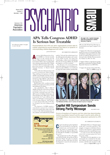Before adjourning for its winter recess last month, Congress acted on legislation that would improve patient safety and explain the privacy impact of federal rules.
To encourage physicians and health care professionals to report medical mistakes, the legislation would ensure confidentiality for anyone who reports that information.
The Ways and Means and Energy and Commerce committees of the House of Representatives approved similar patient safety bills in September, though the bills had yet to be reconciled at press time. A key difference is that the Ways and Means bill would be included in the Medicare statute, while the Energy and Commerce version would be included in the Public Health Service Act, according to an article in the October 4 iHealth Beat.
The Ways and Means bill, the Patient Safety Improvement Act (HR 4889), was introduced in June by Rep. Nancy Johnson (R-Conn.) and has the support of the Bush administration.
Reports of medical mistakes by health care professionals, organizations, and facilities would be considered privileged information and shielded from the discovery process in lawsuits, according to Johnson’s bill.
Johnson chairs the Ways and Means Subcommittee on Health, which held a hearing on medical error legislation in September. “The fear of legal liability has had a chilling effect on the development of the reporting and analysis of errors. These data can save lives and create a health care delivery system capable of continuous quality improvement,” said Johnson in a press statement.
A Senate companion bill (S 2590) was introduced in June by Sens. James Jeffords (I-Vt.) and Bill Frist (R-Tenn.). However, some Democrats and consumer advocates oppose the legal shield for patient safety data during the discovery process, fearing that attorneys would not be able to gain access to any patient information such as medical diagnosis and treatment, according to the September 25 iHealth Beat.
To remedy that, Sen. Edward Kennedy (D-Mass.) introduced the Patient Safety Improvement and Medical Injury Reduction Act (S 3029) last month. This bill would allow patient and hospital records to be used in federal or state civil or administrative proceedings under certain conditions and when permitted by federal or state law.
The bill was referred to the Health, Education, Labor, and Pensions Committee, where it is awaiting action. Kenned is chair of this committee.
The bills would establish local independent Patient Safety Organizations (PSOs) to collect and analyze medical error data and report back to health care professionals to prevent future mistakes, according to the legislation.
The PSOs would forward the confidential health information to the Center for Quality Improvement and Patient Safety, housed in the federal Agency for Healthcare Research and Quality (AHRQ).
The center would collect the information in a national medical-errors database that researchers could use to identify national trends and recommend best practices to the health care industry, according to Johnson’s statement.
The legislation would also provide federal grants to encourage local health care organizations to increase their use of information technology and develop physician electronic prescribing systems to reduce medical errors.
The use of advanced prescribing software and computerized physician order systems was one of the recommendations made in the landmark 1999 Institute of Medicine report titled “To Err Is Human: Building a Safer Health System.”
The report estimated that between 44,000 and 98,000 Americans die annually due to medical errors, making them the eighth-leading cause of death in the United States.
In other congressional news, the House of Representatives passed a bill last month (HR 4561) written by Rep. Bob Barr (R-Ga.) requiring federal agencies that issue proposed regulations for public comment to include an analysis of how privacy would be affected.
The bill would also allow individuals to file lawsuits against agencies whose reviews are inadequate. A companion bill (S 2492) was awaiting action in the Senate last month.
Details and summaries of the legislation can be accessed on the Web at www.thomas.loc.gov by searching on the appropriate bill number. ▪
